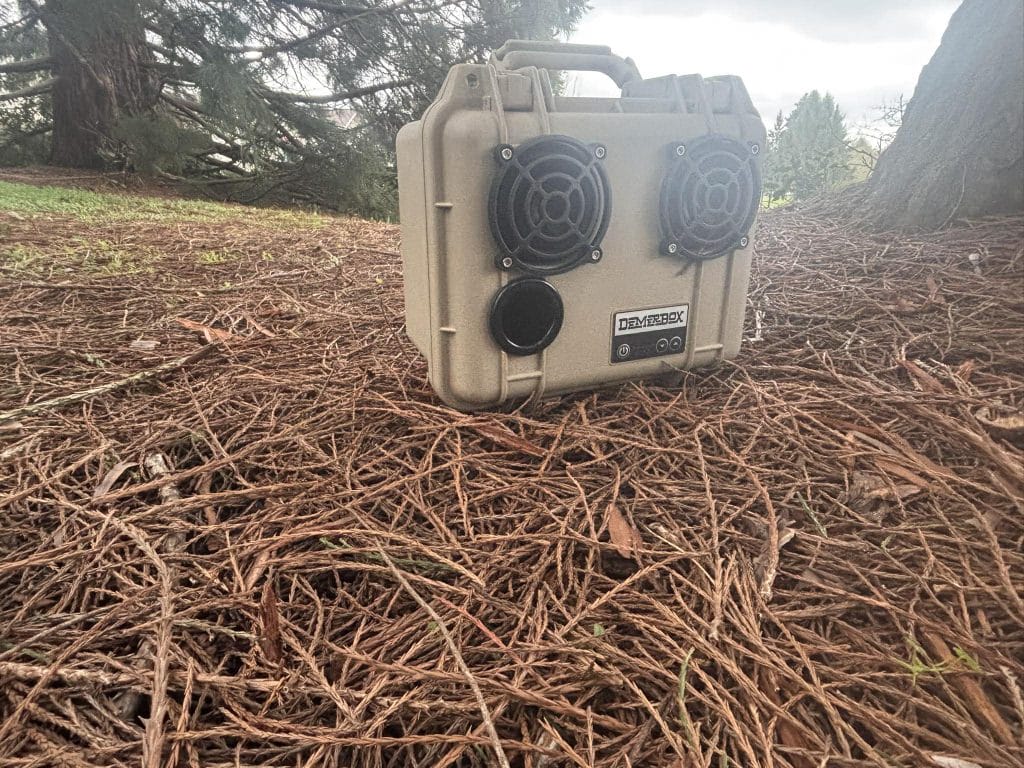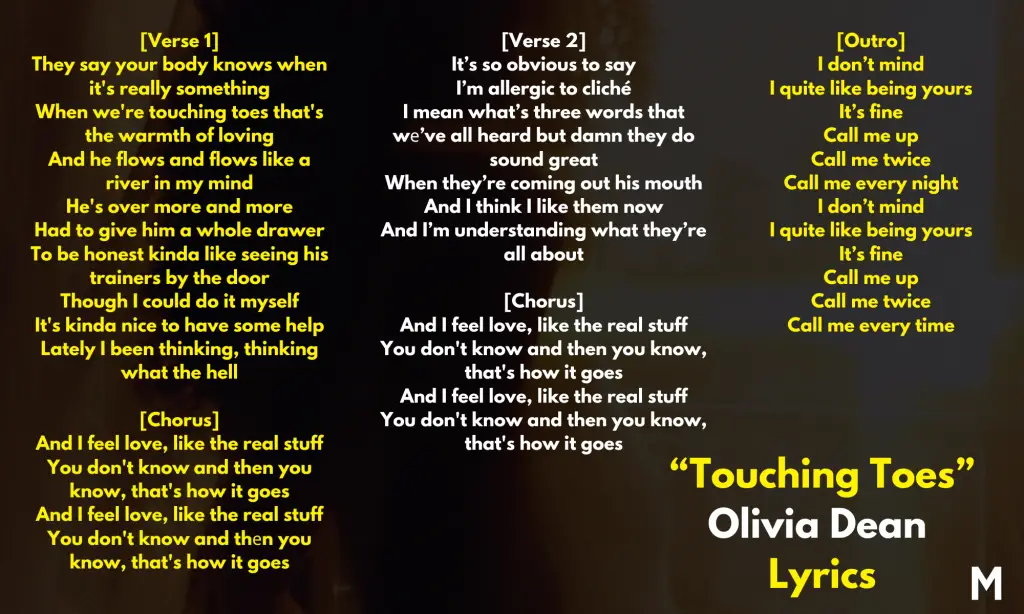Table of Contents
Image C/O Capitol Records UK
Olivia Dean’s “Touching Toes” is the kind of song that rewards you for paying attention. It’s stripped-back, short, and quietly devastating in how much it says without really trying.
Dean described it as a love song about the small stuff—letting someone into your space, noticing their shoes by the door, and that moment when it all clicks: “Oh, this is love.” It’s intimate and unpolished in the best way, feeling like a diary entry you weren’t supposed to find. Following her critically acclaimed debut album Messy, this track feels like a bookend to a chapter in her career, but it’s also a reflection of the themes she’s always nailed: connection, vulnerability, and a sharp eye for the little things.
For me, this is the kind of song that begs for a closer look. My background in English literature and creative writing makes it impossible not to see the poetry in lines like these—love described in drawer space and touching toes. That’s classic stuff, the kind of subtle intimacy you’d find in a Philip Larkin poem or in Elizabeth Barrett Browning’s sonnets.
Of course, this is just my take, but I think this song is a perfect excuse to dig into how writers across time have wrestled with these same ideas. What can Larkin’s quiet domesticity, Browning’s yearning sincerity, or Frank O’Hara’s celebration of the everyday tell us about the deeper meaning in “Touching Toes”?
Let’s dive in.
Touching Toes Olivia Dean Lyrics
Touching Toes Olivia Dean Meaning
“They say your body knows when it’s really something”
This opening line pulls us straight into the narrator’s experience of love. It’s not about logic or overthinking—it’s about feeling. The body knows. Love here is physical and instinctive, something you sense before you can even explain it.
This idea reminds me of how Philip Larkin describes love in “An Arundel Tomb.” He writes about how love can be felt in small, quiet gestures, like a couple’s hands carved together on a statue. His line, “What will survive of us is love,”shows that love often speaks louder in actions and feelings than in words. In the song, the warmth of “touching toes” is another example of how love doesn’t need grand declarations; it’s felt deeply in these simple, everyday moments.
The rest of the verse digs deeper into how love starts changing the narrator’s life. Lines like:
“Had to give him a whole drawer… kinda like seeing his trainers by the door”
capture the way love naturally finds its way into your routine. These details might seem small, but they show how love becomes part of your world. Larkin’s quiet focus on little things is echoed here, proving that love isn’t always loud—it’s steady and comforting.
“You don’t know and then you know, that’s how it goes”
This chorus gets straight to the heart of what the song is about: the moment you realize you’re in love. It’s not something you can predict or plan for. One day, you’re just in it. That’s such a universal feeling, and the way it’s written here keeps it simple and relatable.
Elizabeth Barrett Browning touches on this in “Sonnet 14.” She writes, “If thou must love me, let it be for nought / Except for love’s sake only.” Browning believed love should be natural, not forced or based on shallow reasons. The lyrics say something similar. Love, when it’s real, isn’t something you decide—it’s something you discover. That’s why the narrator can’t explain it. They just know it’s “the real stuff.”
This also makes the repetition of the line so important. By saying it over and over, the narrator emphasizes how love takes over completely once you feel it. It’s no longer a question or a doubt—it’s a fact.
“I’m allergic to cliché”
This is such an honest line. The narrator doesn’t want their love to feel fake or scripted. They want it to be authentic. That’s why they’re skeptical of clichés at first. But then they admit:
“Damn, they do sound great when they’re coming out his mouth.”
This shows how love changes everything. Even something as common as saying “I love you” feels brand new when it’s real. The narrator realizes that it’s not about the words themselves—it’s about the person saying them.
Frank O’Hara captures this perfectly in “Having a Coke with You.” He writes about how love makes everything—no matter how simple—feel special. His line, “It is hard to believe when I’m with you / that there can be anything as still,”reminds us that love changes the way we see the world. In the song, the narrator’s shift from rejecting clichés to loving them shows how love makes even the ordinary feel extraordinary.
“Though I could do it myself, it’s kinda nice to have some help”
This line brings us back to the practical, everyday side of love. It’s not about needing someone to survive—it’s about appreciating how their presence makes life easier and more enjoyable. The narrator is learning to trust and rely on someone else, which takes real vulnerability.
This reminds me of Philip Larkin’s “An Arundel Tomb,” where the couple’s carved hands symbolize their quiet connection. Larkin’s line, “The stone fidelity / They hardly meant has come to be,” shows how love often speaks through simple acts of closeness. In the song, things like sharing space or asking for help aren’t dramatic, but they’re deeply meaningful. They show how love blends into the everyday, making it richer and more connected.
The narrator’s honesty here is key. Admitting they could do things alone but choosing to let someone in shows real growth. Love isn’t about losing independence—it’s about finding strength in partnership.
“I don’t mind, I quite like being yours”
By the end of the song, the narrator is fully open to love. They’ve stopped questioning it, stopped resisting it, and embraced how good it feels to be connected to someone. Saying, “I don’t mind” might sound casual, but it’s actually a huge step. It shows they’re comfortable with the relationship and okay with being vulnerable.
Elizabeth Barrett Browning’s “Sonnet 14” talks about love that lasts because it’s built on something real. Her line, “And love me for love’s sake, that evermore / Thou mayst love on, through love’s eternity,” is about accepting love for what it is—steady, honest, and enduring. The narrator in the song feels the same way by this point. They’ve let go of doubts and embraced how safe and happy the relationship makes them.
Lines like:
“Call me up, call me twice, call me every time”
show how love becomes about showing up and being there for each other. It’s about consistency, not just feelings. The narrator now trusts in that consistency, which is why the song ends on such a confident, content note.Main Takeaways For Me
At its core, “Touching Toes” is about how love shows up in the smallest, most ordinary ways. Olivia Dean has called it a song about “letting someone into your space” and the quiet shift in your mind when you realize you’re in love. That shift isn’t loud—it’s subtle, like noticing their shoes by the door or giving them a drawer.
These moments might feel small, but they represent something much bigger: the blending of two lives. Dean’s choice to pair this theme with a stripped-back acoustic sound makes it feel even more intimate, as if we’re being let into a secret.
This focus on the small details of love connects strongly to Philip Larkin’s “An Arundel Tomb.” Larkin’s poem captures love in something as understated as a carved stone couple holding hands. The line, “What will survive of us is love,”suggests that love isn’t about the big displays—it’s about the quiet, lasting signs of connection. Dean’s lyrics do the same thing. When she sings about “touching toes” or realizing it’s “kinda nice to have some help,” she’s showing us how love lives in those little, everyday moments.
Just like the hand-holding in Larkin’s poem, these details aren’t flashy, but they’re where love finds its roots.
Dean’s rejection of clichés in the song also reminds me of Elizabeth Barrett Browning’s “Sonnet 14.” Dean sings, “I’m allergic to cliché,” which feels like a modern take on Browning’s insistence that love should be authentic, not wrapped up in empty words.
Browning’s line, “If thou must love me, let it be for nought / Except for love’s sake only,” gets at the same truth. Both writers push past what love is supposed to sound like, only to circle back and find beauty in what’s real. Dean even admits this in the song when she sings, “Damn, they do sound great when they’re coming out his mouth.” It’s a shift that feels relatable and honest—love changes how even the simplest, most overused phrases can hit you differently when they’re genuine.
And then there’s Frank O’Hara’s “Having a Coke with You,” which nails the way love makes the mundane feel magical. O’Hara writes about how being with someone you love transforms even a small moment, saying, “It is hard to believe when I’m with you / that there can be anything as still.” Dean captures this same feeling in “Touching Toes.” The physical closeness of sharing space—like literally touching toes—becomes a stand-in for emotional closeness.
Both O’Hara and Dean show us that love doesn’t need dramatic fireworks to feel profound. It’s the tiny, everyday interactions that hold the deepest meaning. Dean’s lyrics remind us that these moments might seem ordinary on the surface, but they’re where love truly lives.
The post Touching Toes Olivia Dean Lyrics And Meaning: Breaking Down Love’s Quiet Moments appeared first on Magnetic Magazine.






